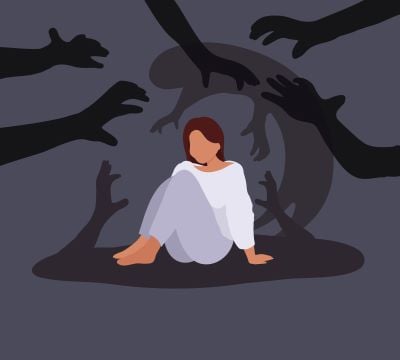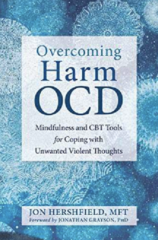Harm OCD vs. Being Dangerous
Harm OCD vs. Being Dangerous

Are you suffering from harm OCD or are you dangerous?
Fortunately, for most people, occasional bad thoughts are nothing but a momentary irritation. Most of us can accept that having unacceptable feelings, urges and thoughts is part of being human. However, some individuals are inundated by unwanted violent thoughts nearly every waking hour, and the problem becomes so severe that the thoughts are termed obsessions. Typically, the thoughts consist of the very thing that the individual believes is the most awful, shameful and inappropriate thing one could do. Unwanted, intrusive thoughts, images and urges are often violent in nature and can include:
- fear of committing harm or violence toward a loved one, e.g., one’s partner, child or parents
- fear of “snapping” and committing a mass murder
- fear of engaging in self-harm or suicide
- fear of sexually assaulting someone
- fear of wanting to engage in abhorrent sexual acts
- fear of becoming schizophrenic or psychotic, losing control and acting out violently
These types of thoughts, images and urges are typically referred to as Harm OCD and they can cause significant distress and anxiety in sufferers, leading to compulsions that are intended to reduce the fear of causing harm. Common strategies include seeking reassurance from others, avoidance of certain people or situations, compulsive checking behaviors, attempting to suppress the thoughts, neutralizing the thought with certain phrases or prayers and attempting to analyze or figure out whether these thoughts mean anything.
Unfortunately, many individuals with Harm OCD receive treatment for their problem with traditional talk therapy, which usually prolongs or worsens suffering by encouraging the individual to focus on examining these thoughts, which makes the thoughts take on even more importance and meaning. Effective treatment for Harm OCD involves a combination of cognitive behavioral therapy (CBT) with an emphasis on exposure and response prevention (ERP). CBT/ERP helps individuals gain insight into their thought patterns and learn new ways of responding to their obsessions. ERP involves gradually exposing the individual to situations that provoke discomfort, fear, or distress in a safe and supported environment. Through this process, individuals can slowly learn to tolerate anxiety-provoking situations while developing strategies for coping with intrusive thoughts without engaging in compulsive behaviors. Mindfulness strategies are often incorporated into treatment and focuses on learning to view the thoughts as transient thoughts and not threats. With proper treatment, those affected by Harm OCD can learn to better manage their intrusive thoughts.
It is important to note that Harm OCD does not indicate a risk of carrying out actual physical harm. While the thoughts associated with Harm OCD can be disturbing and distressing, they usually remain within the realm of ego-dystonic thoughts -- meaning they are contrary to one's own values, beliefs, and sense of self. These intrusive thoughts should not be interpreted as true reflections of someone's internal state or intentions. It is up to qualified mental health professionals to assess potential risks for actual physical harm or suicidal ideation in order to provide appropriate intervention and care.
People who are truly at risk of harm to others typically find pleasure in the thoughts and these thoughts are ego-syntonic, meaning the thoughts align with the individual’s sense of self. Individuals who feel unmanageable anger and find it difficult to resist acting on aggressive impulses, people who have a history of having acted out violently or sexually either while sober or under the influence of a substance, people who hear voices, see or hear things that others don’t or feel people are out to get them are all situations in which one should be concerned.
It is important to remember that recovery from Harm OCD is possible! With proper treatment from an OCD specialist, those affected by this condition can learn to manage their intrusive thoughts and fears, leading to a healthier and happier life.
This post is presented in collaboration with ADAA's OCD and Related Disorders SIG. Learn more about the SIG.
















